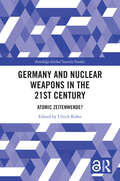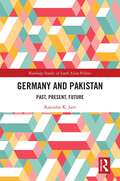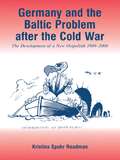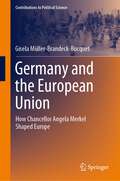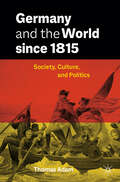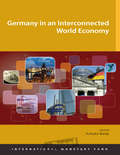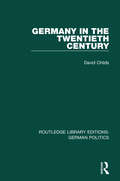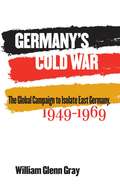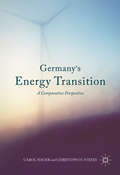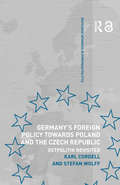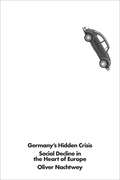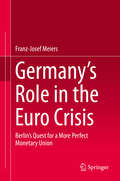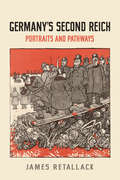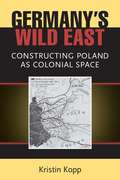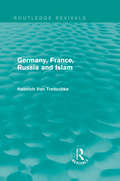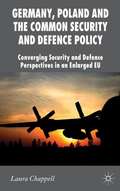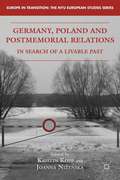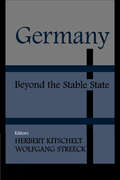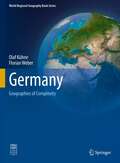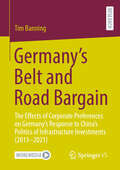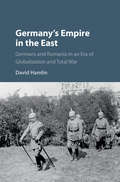- Table View
- List View
Germany and Nuclear Weapons in the 21st Century: Atomic Zeitenwende? (Routledge Global Security Studies)
by Ulrich KühnThis book is the first scholarly book to take a comprehensive look at Germany’s nuclear weapons policies in the 21st century.German foreign and security policy is facing a profound reorientation. Great power competition between the United States and both a revanchist Russia and a rising China, the return of war and nuclear threats to Europe, and the emergence of new technologies all force Germany to adapt. German policymakers and scholars increasingly speak of a pivotal Zeitenwende, an epochal turning point in history. How does Germany adapt its nuclear policies to these changing conditions?The volume brings together internationally renowned nuclear scholars and policy analysts from Germany and abroad. Focussing on German nuclear deterrence, arms control and disarmament as well as nonproliferation policies, the contributors assess how German leaders have navigated continuity and change, domestically and abroad. The volume concludes that Germany remains bound by dependence on the United States and its own conservatism. Within these parameters, German leaders have adapted slowly to change and continue to balance seemingly contradictory deterrence and disarmament goals.This book will be of much interest to students of nuclear proliferation, security studies, German politics and International Relations, as well as policymakers.
Germany and Pakistan: Past, Present, Future (Routledge Studies in South Asian Politics)
by Rajendra K. JainThis book explores Germany’s political, economic, defence, nuclear and cultural relations as well as defence cooperation with and arms transfers to Pakistan from 1949 to the present day.Pakistan shares a multidimensional relationship with the Federal Republic of Germany, which is its largest trading partner within the European Union and a significant donor. Drawing on extensive English and German language source material, including declassified documents of the German Foreign Office, this book reveals for the first time details of conversations between Pakistani and German leaders and officials. Filling a long‑felt gap in the available literature on Europe‑South Asia relations, this well‑researched book examines mutual perceptions, the complexity, the elements of convergence and divergence as well as the challenges and prospects of Germany’s relations with Pakistan.This book will be a valuable contribution to the field of International Relations, International History, as well as Pakistan’s and Germany’s foreign policies.
Germany and the Baltic Problem After the Cold War: The Development of a New Ostpolitik, 1989-2000
by Kristina Spohr ReadmanThe root question this book addresses is how the new Germany will use its re-found status as a great power. Does Germany - as in the past - aim to dominate Europe? Or has it renounced its imperial ambitions following the trauma of division during the Cold War?In seeking answers to these questions, Kristina Spohr Readman scrutinises the development of Germany's new Ostpolitik (eastern policy) in the period 1989-2000. Against the background of recent European history, she analyses the re-establishment of a special relationship between Bonn/Berlin and Moscow. In particular, she assesses the peculiar geopolitical situation of the Baltic states: caught between a turbulent Russia in the east and a unified Germany in the west. The Baltic case reveals the complexities of a post-Cold War European security architecture in the making.
Germany and the European Union: How Chancellor Angela Merkel Shaped Europe (Contributions to Political Science)
by Gisela Müller-Brandeck-BocquetThis book aims to present a coherent picture of Germany’s European policy during Merkel’s chancellorship. At the same time, it traces the development of the EU in the period 2005–2021. Accordingly, the European crises and the internal and external threats to the integration community are addressed, as well as the jointly developed solutions. Thus, on the one hand, the book shows what Germany was willing to do for Europe; on the other, it reveals how the EU was able to develop further as the most important point of reference for German politics and power.
Germany and the Politics of Europe's Money
by Karl KaltenthalerAs countries in the European Union struggle to comply with the Maastricht Treaty, the question of monetary integration is at the forefront of European politics. Germany and the Politics of Europe's Money explores how and why Germany--whose economic power makes it a pivotal player in the European monetary system--has developed inconsistent policies toward European monetary institutions and how international institutions affect domestic politics that, in turn, influence state policies toward these institutions.Moving away from state-centered and Marxist approaches to the study of the European monetary integration process, Karl Kaltenthaler offers a new analytical framework to assess the dynamics within and among the participating countries. Using official and unofficial documents as well as interviews with players ranging from presidents of the Bundesbank to functionaries in the trade unions, Kaltenthaler argues that the number of decision makers negotiating policy and their accountability to interest groups, political parties, government ministries, and Germany's central bank have made Germany's fluctuations in policy inevitable. Germany and the Politics of Europe's Money examines twenty years of German policy through an analysis of four key episodes: the creation of the European Monetary System, the creation of the Franco-German Economic and Financial Council, the establishment of policy toward the European Monetary Union, and the institutional transformation of the EMS in the 1990s. It thus brings a new understanding to Germany's dynamic policies and the political forces behind them.
Germany and the World since 1815: Society, Culture, and Politics
by Thomas AdamThis textbook provides a history of modern Germany, locating the country’s social, cultural, and political developments within their proper global and transnational context. The author argues that most developments in German culture, society, and politics throughout the nineteenth and twentieth centuries were caused by wider global and transnational trends. A history of the German people rather than the German state, the book focusses on non-state and non-government actors, intercultural transfers, and applies the approach of ‘thick description’ to analysing the creation of German culture, society, and identity from the era of the Napoleonic wars right up to the present post-unification Germany. This includes an examination of German migrants’ journeys to their new homes in the Americas and, thus, the creation of a global German diaspora with cultural and social networks beyond its home country’s borders. The book further focusses on the transfers that connected German society and culture with those of other countries; for instance, chapters cover the transfer of football from England to Germany, the transfer of the Christmas holiday tradition from Germany to other countries, and the development of eugenics in Germany within its global context.
Germany in an Interconnected World Economy
by Ashoka ModyA report from the International Monetary Fund.
Germany in the Twentieth Century (Routledge Library Editions: German Politics)
by David ChildsThe book traces the development of Germany from the Kaiser’s Reich in the 1870s to the reunited democratic state led by Helmut Kohl in the 1990s. The author begins by countering the popular view of Germany before 1914 as irredeemably reactionary, and after assessing Germany’s part in the First World War, he outlines the rise and fall of the Weimar Republic. The 12 years of Hitler’s destructive experiment are presented in a balanced way as part of the overall development of the country. Germany in defeat is then discussed, as is heer rebirth under Four Power occupation. The last chapters explore the two separate German states and the events leading up to the restoration of German unity.
Germany's Cold War: The Global Campaign to Isolate East Germany, 1949-1969
by William Glenn GrayUsing newly available material from both sides of the Iron Curtain, William Glenn Gray explores West Germany's efforts to prevent international acceptance of East Germany as a legitimate state following World War II. Unwilling to accept the division of their country, West German leaders regarded the German Democratic Republic (GDR) as an illegitimate upstart--a puppet of the occupying Soviet forces. Together with France, Britain, and the United States, West Germany applied political and financial pressure around the globe to ensure that the GDR remain unrecognized by all countries outside the communist camp. Proclamations of ideological solidarity and narrowly targeted bursts of aid gave the GDR momentary leverage in such diverse countries as Egypt, Iraq, Ghana, and Indonesia; yet West Germany's intimidation tactics, coupled with its vastly superior economic resources, blocked any decisive East German breakthrough. Gray argues that Bonn's isolation campaign was dropped not for want of success, but as a result of changes in West German priorities as the struggle against East Germany came to hamper efforts at reconciliation with Israel, Poland, and Yugoslavia--all countries of special relevance to Germany's recent past. Interest in a morally grounded diplomacy, together with the growing conviction that the GDR could no longer be ignored, led to the abandonment of Bonn's effective but outdated efforts to hinder worldwide recognition of the East German regime.
Germany's Energy Transition
by Carol Hager Christoph H. StefesThis book analyzes Germany's path-breaking Energiewende, the country's transition from an energy system based on fossil and nuclear fuels to a sustainable energy system based on renewables. The authors explain Germany's commitment to a renewable energy transition on multiple levels of governance, from the local to the European, focusing on the sources of institutional change that made the transition possible. They then place the German case in international context through comparative case studies of energy transitions in the USA, China, and Japan. These chapters highlight the multifaceted challenges, and the enormous potential, in different paths to a sustainable energy future. Taken together, they tell the story of one of the most important political, economic, and social undertakings of our time.
Germany's Foreign Policy Towards Poland and the Czech Republic: Ostpolitik Revisited (Routledge Advances in European Politics #Vol. 28)
by Stefan Wolff Karl CordellThis is a new exploration of how the events of the twentieth century still cast a shadow over relations between Germany, Poland and the Czech Republic.Using social constructivism theory, it provides a comparative assessment of Germany's post-reunification relations with the Czech Republic and Poland within the framework of the contemporary alliance structure. Identifying the key actors and factors, Cordell and Wolff examine the long-standing continuity in the norms and values that underpin German foreign policy and explore the issues of borders, territory, identities, minorities and population transfers. Paying particular attention to the process of European integration and the role of the new Germany within Europe, the authors identify how new possibilities for co-operation might finally overcome legacies of the past. This pioneering study will be of particular interest to students of European politics and international studies.
Germany's Hidden Crisis: Social Decline in the Heart of Europe
by Oliver NachtweyAn excellent study of how neoliberalism is causing a crisis in GermanyOne of the German-speaking world's leading young sociologists lays out modern Germany's social and political crisis and its implications for the future of the European hegemon. Upward social mobility represented a core promise of life under the "old" West German welfare state, in which millions of skilled workers upgraded their VWs to Audis, bought their first homes, and sent their children to university. Not so in today's Federal Republic, however, where the gears of the so-called "elevator society" have long since ground to a halt. In the absence of the social mobility of yesterday, widespread social exhaustion and anxiety have emerged across mainstream society. Oliver Nachtwey analyses the reasons for this social rupture in post-war German society and investigates the conflict potential emerging as a result, concluding that although the country has managed to muddle through the Eurocrisis largely unscathed thus far, simmering tensions beneath the surface nevertheless threaten to undermine the German system's stability in the years to come.
Germany's Role in the Euro Crisis
by Franz-Josef MeiersThis book analyses Germany's role in the euro crisis. Based on the perception of Berlin as the emerging capital of the European Union, the author investigates three interrelated issues: Did the German policy approach of imposing austerity programs on countries in the middle of a deep recession contribute to the successful management of the euro crisis? Does Germany extend its sway over its European partners by forcing them to surrender to the German diktat of fiscal Disziplin and economic efficiency? Is the stubborn insistence on rigid fiscal adjustment another ominous sign of the Berlin Republic moving away from the country's traditional European vocation toward an imperial leadership role? The book's main argument is that Germany's role in and responses to the euro crisis can best be explained by different concepts of self, historical memory, and institutional practices.
Germany's Second Reich
by James RetallackDespite recent studies of imperial Germany that emphasize the empire's modern and reformist qualities, the question remains: to what extent could democracy have flourished in Germany's stony soil? In Germany's Second Reich, James Retallack continues his career-long inquiry into the era of Bismarck and Kaiser Wilhelm II with a wide-ranging reassessment of the period and its connections with past traditions and future possibilities.In this volume, Retallack reveals the complex and contradictory nature of the Second Reich, presenting Imperial Germany as it was seen by outsiders and insiders as well as by historians, political scientists, and sociologists ever since.
Germany's Vision of Empire in Venezuela: 1871-1914
by Holger HerwigThe author details Imperial Germany's interests in Venezuela (and all South America) from the ascension of Wilhelm II to the outbreak of WWI.
Germany's War and the Holocaust: Disputed Histories
by Omer BartovWhile attempts to come to terms with past catastrophe . . . can help prevent its recurrence, they may also provide arguments for . . . actions against the real or imagined perpetrators of previous disasters. The confrontation with . . . catastrophe can help us understand the roots and nature of this century's destructive urges, as well as humanity's extraordinary recuperative capacities; but it can also legitimize the perpetuation of violence and aggression. -from the Introduction Omer Bartov, a leading scholar of the Wehrmacht and the Holocaust, provides a critical analysis of various recent ways to understand the genocidal policies of the Nazi regime and the reconstruction of German and Jewish identities in the wake of World War II. Germany's War and the Holocaust both deepens our understanding of a crucial period in history and serves as an invaluable introduction to the vast body of literature in the field of Holocaust studies. Drawing on his background as a military historian to probe the nature of German warfare, Bartov considers the postwar myth of army resistance to Hitler and investigates the image of Blitzkrieg as a means to glorify war, debilitate the enemy, and hide the realities of mass destruction. The author also addresses several new analyses of the roots and nature of Nazi extermination policies, including revisionist views of the concentration camps. Finally, Bartov examines some paradigmatic interpretations of the Nazi period and its aftermath: the changing American, European, and Israeli discourses on the Holocaust; Victor Klemperer's view of Nazi Germany from within; and Germany's perception of its own victimhood.
Germany's Wild East: Constructing Poland as Colonial Space
by Kristin KoppIn the nineteenth and early twentieth centuries, representations of Poland and the Slavic East cast the region as a primitive, undeveloped, or empty space inhabited by a population destined to remain uncivilized without the aid of external intervention. These depictions often made direct reference to the American Wild West, portraying the eastern steppes as a boundless plain that needed to be wrested from the hands of unruly natives and spatially ordered into German-administrated units. While conventional definitions locate colonial space overseas, Kristin Kopp argues that it was possible to understand both distant continents and adjacent Eastern Europe as parts of the same global periphery dependent upon Western European civilizing efforts. However, proximity to the source of aid translated to greater benefits for Eastern Europe than for more distant regions.
Germany, France, Russia and Islam (Routledge Revivals)
by Heinrich Von TreitschkeHeinrich Von Treitschke was a prolific German historian and political writer during the nineteenth century. In Germany, France, Russia and Islam, first published in 1915, he considers European diplomatic relations from the patriotic perspective of imperial Germany, in particular examining Germany’s relationship to Turkey and France. This is a fascinating classic work, which will be of great value to academics and students interested in nineteenth-century European politics and history.
Germany, Poland and the Common Security and Defence Policy
by Laura ChappellA comparative analysis of an old and new EU Member State's perceptions of and contributions to EU security and defence. This book focuses on change and continuity in both countries' defence policies and where convergence and divergence has occurred. This has important implications for the EU's effectiveness as an international security actor.
Germany, Poland, and Postmemorial Relations
by Kristin Kopp Joanna NiżyńskaCovering the period following the collapse of communism, the unification of Germany, and Poland's accession to the EU, this collection focuses on the interdependencies of German, Polish, and Jewish collective memories and their dialogic, transnational character, showing the collective nature of postmemory and the pressures that shape it.
Germany: Beyond the Stable State (Studies In Political Economy Ser.)
by Wolfgang Streeck Herbert KitscheltFrom the 1960s to the 1980s, observers gave the name "Model Germany" to the Federal Republic. They saw in Germany a political-economic "model" that was able to weather many economic challenges. "Model Germany" permitted political competition, while coordinating public policy among interest associations and private businesses so that changes would only take place only in a balanced and positive way.Since the early 1990s this "German Model" has faced serious troubles. Authors in this book describe its disintegration in the past decade and probe into the causes of this. Articles argue that it is Germany's national and European integration that has triggered the model's unravelling.These processes are paralleled by tendencies in public opinion, social life styles, and political mobilization in parties, interest groups, and social movements. The strains of "model Germany" show up in the transformation of industrial relations, corporate governance structures, and social and immigration policies in Germany.
Germany: Geographies of Complexity (World Regional Geography Book Series)
by Olaf Kühne Florian WeberThis book addresses the highly differentiated spatial, social, cultural and demographic structure(s) of Germany, with a particular focus on the reciprocal relations between different levels of spatial development. The historical development of Germany serves as a background in order to provide context for the development of spatially relevant ideas and ideals (whether in relation to politics, landscape, or culture). In this regard, questions of divergence and convergence become highly salient. The book makes the complexity of spatial and social developments in Germany comprehensible. The neopragmatic approach adopted here allows bringing together different theoretical strands while providing a basis for independent regional geographic research at the same time. Beginning with an overview of the physical structures of Germany which provides the material point of departure for the societal development of Germany, key aspects of the German history are discussed. Particular attention is paid to the reciprocal influence between material substrate and notions of landscape. Here, specific ‘German’ trajectories of aesthetic and normative conceptions of landscape become clear. A common theme throughout the book are questions of divergence and of efforts towards convergence, which become evident when considering past and present economic, political, and demographic developments. Efforts to tackle current challenges, such as adapting to climate change and mitigating it, or securing raw materials, also become apparent. The complexity of spatial processes in Germany is illustrated in case study regions dealing with the challenges of structural change in traditional industrial regions (such as the Ruhr area), or e.g. efforts of Berlin to position and find itself as the capital of a unified Germany. Overall, the book shows how theory-driven regional geographic research can make spatiotemporal complexities tangible and comprehensible.
Germany’s Belt and Road Bargain: The Effects of Corporate Preferences on Germany’s Response to China’s Politics of Infrastructure Investments (2013 – 2021)
by Tim BanningIn recent years, the Belt and Road Initiative (BRI) has not only transformed global trade relations but also tested Germany’s political strategies. This book explores the German Federal Government’s ambivalent response to China’s politics of infrastructure investments under the BRI during Angela Merkel’s tenure as Chancellor, raising crucial questions about Germany’s bilateral relations with China, its economic ambition, and its geopolitical responsibility. This book provides a detailed account of the key political processes and decision points that influenced the Federal Government’s stance towards China’s politics of infrastructure investments. Through its analysis of the interactions between domestic politics and international relations, it aims to offer a nuanced understanding of the complex dynamics between the state and business. It examines how the varying interests of numerous industry sectors impacted the Federal Government’s response to China’s politics of infrastructure investments across multiple policy domains, covering Germany’s policy on foreign investments and foreign trade, its industrial policy, its broader foreign policy, and its role in European politics.
Germany’s Economic
by Jack EwingIn Germany's Economic Renaissance, veteran European correspondent Jack Ewing of The International New York Times explains how a country with some of the highest labor and energy costs in the world beat the odds to become the third-largest exporter of manufactured goods, after China and the United States. Men and women who manage German companies both big and small explain how any company can behave like a multinational, as well as the secrets of conquering the high end of the market where quality is more important than price. Both informative and entertaining, filled with rich character studies, this book is essential reading for everyone wondering how to bring factories - and the jobs they provide - back to American shores.
Germany’s Empire in the East: Germans and Romania in an Era of Globalization and Total War
by David HamlinThis book puts German policy toward Romania and the German East into a global context. One of the signal events of the twentieth century was Germany's effort to construct an empire in Europe modeled on the European experience outside Europe. The turn to European empire resulted less from the dynamics of capitalist expansion than from a deep crisis in global political and economic order. Confronted with the global economic and political power of the western allies, the Germans turned to Eastern Europe to construct a dependent space, tied to Germany as Central America was to the US. The First World War transformed how Germans thought about international order, empire and the nature of Romanians. The domestic consequences of Germany's eviction from global markets authorized deep interventions in Romanian society to establish a pre-eminent position for the German state inside Romania. David Hamlin embeds occupation and war aims in economic concerns.
